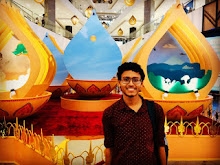Is this
Historical Fiction? Or is this mythological fiction? Is it magic? Or fantasy?
“Ashok and the Nine
Unknown” gets concluded with a delightful mix of all these elements, making it
a book worth remembering.
There was a
reason was King Ashok—the powerful ruler of the Mauryan Empire—was called ‘Ashok
the great’. After the end of the bloodliest battle in history, The Kalinga
War, Ashok understands the reality of the brutal aftermath of wars. He pledges
for peace and devotes his life towards the welfare of his people. Amartya, a Kalingan
who had lost his family in the war, vows to take revenge on the king. He goes
to the hilly province of Mayong, which is famous for wizardry and magical spells.
Meanwhile, Ashok assembles nine people—whom he calls ‘the nine unknown’—each a
master of their respective fields like psychology, sociology, microbiology and astronomy.
Amartya’s quest to avenge on Ashok makes him surrender to brutal magic and
witchcraft never seen before. It turns out that the mythical city of Atlantis
has something to do with Ashok and the Kalinga war, which ultimately relates
them to the desert lands of Egypt. Does Ashok’s nine courtiers have something
to do with it? What conspiracy is lurking under the dark to pounce against mankind?
The author ties many mythical aspects of the past to bring
to us an exciting adventurous experience. He starts the story with Ashok’s
empire, and within no time he has included the lore of Atlantis into the storyline,
along with Egyptian legends like the Sphinx and Egyptian Gods like Horus, Set
and Ra. This concoction makes the story so unique and exemplary that the
readers are welcomed with one surprise after another. Be it unforeseen plot twists,
enchanting magical sub plots, or the brilliant jugglery between fantasy and
reality—this book has it all. The characterizations see a very able usage of their
distinct personality traits, and they turn out to be vehemently life-like and
original. Lustful and vengeful sides of them are shown, in contrast to their kindness
and compassion. The persons surrounding the king are always dipped in numerous conspiracies
and involvements, and this fact is made to testify in the light of the grey characterisations
Anshul constructs. He ensures that the decisions made by the characters,
justified or not, have surplus backstories to support it. Thereby, through the
roles they have to play in the storyline, they emerge to be multi-layered and
staunchly real.
The character of Amartya has the pivotal role to play in the
plot. We experience his agony and frustration, and his anger at Ashok. We see
him getting transformed to whatever it takes to teach the emperor a lesson, and
himself submitting to evil forces in the process. There are portrayals of the corruption
of power, of our own psychology turning against us to ruin our peace. When
Amartya turns into the blood thirsty, vengeful inhuman beast—we are made to
question the fact that whether Ashok really was able to rectify the losses he
had inflicted upon the lives of the Kalingans? Sheer grimace and helplessness
drips from Amartya’s personality, turning him into an epitome of revenge and
hunger for power. He screams for influence and control, not caring about his
own life in the process.
In the realm of this book, life and death are not so intangible
concepts as we now think of them. Through mysticism and chants, many characters
are able to shatter the barrier of death. The story makes us see for ourselves—that
death is not the cruellest of punishments, rather incessant unbearable pain and
emotional warfare lies at the core of such brutalities.
Although reading the book felt like getting engrossed in a land of magic and myths, a few downsides could be noticed. Towards the end of the book, the plot advancement had become too hasty. With too many parallel happenings and simultaneous segments of the story proceeding at different locations, it was expected that the storyline could be jumbled up. The inclusion of the Egyptian lore wasn’t as fluent as the involvement of the Magadhi culture with Ashok at the epicentre, neither was it well devised like the legend of Atlantis. Too many characters were dying and getting reborn, and it was getting tedious to attach our faith to some of them. The scarcity of ‘strong’ characters (except for Amartya), the kinds who dominate and influence the storyline from start to end was very prominent. A more straightforward distilling of the storyline could have improved the book as a whole. Recommended to all fantasy and historical fiction lovers!
(Disclaimer: This review is in lieu of a review copy)
Publisher: Rupa Publications
Year of Publication: 2018
Pages: 224
Edition: Paperback ( buy here ! )
➦About the Author: Anshul Dupare lives to explore new novel ideas and unexplored avenues through his writing. Brought up in Madhya Pradesh and an alumnus of Maulana Azad National Institute of Technology (MANIT), creative writing has been his hobby for a long time. He is an avid traveller, a voracious reader and is fond of chess and basketball. He currently resides in Dallas, USA. Reach out to him here.






Post a Comment